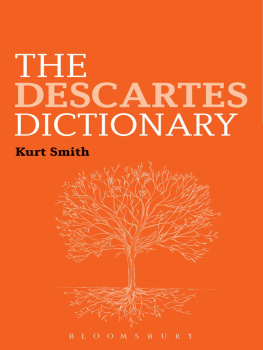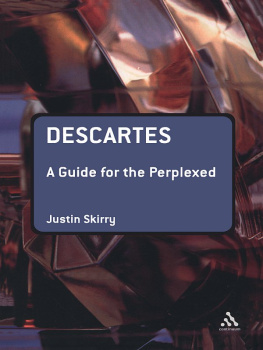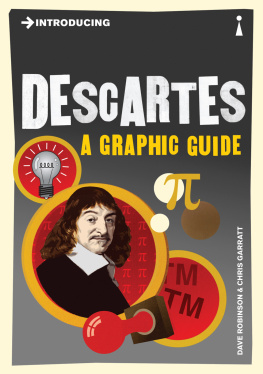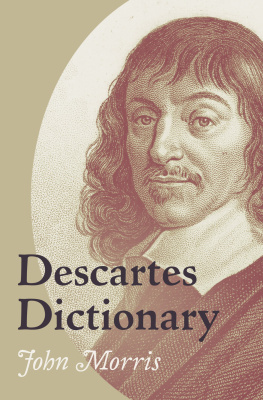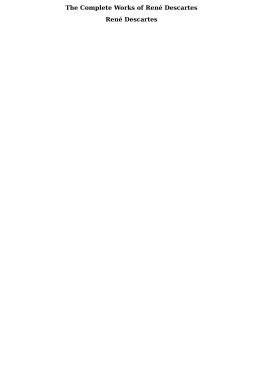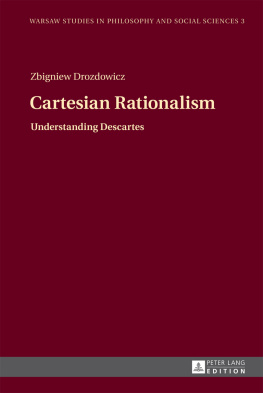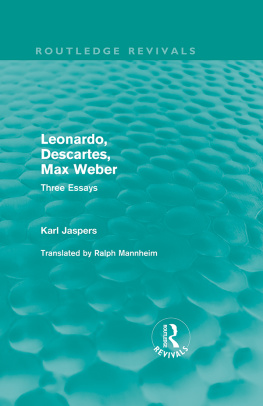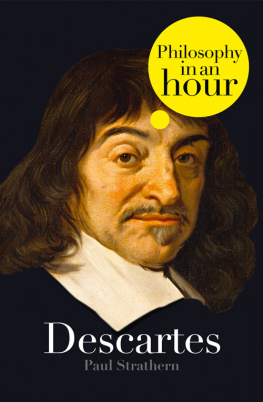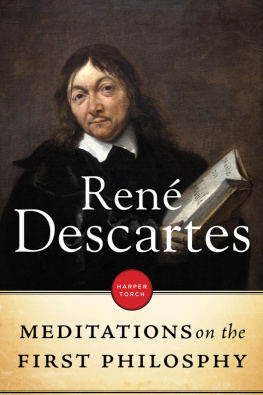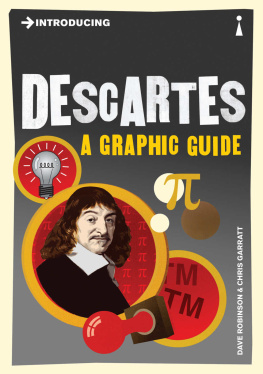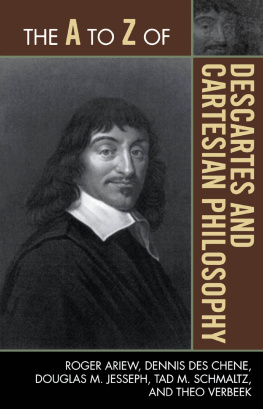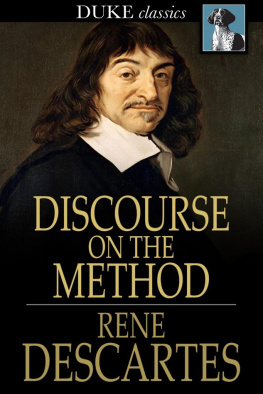The Descartes Dictionary
ALSO AVAILABLE FROM BLOOMSBURY
The Bloomsbury Philosophy Dictionaries offer clear and accessible guides to the work of some of the more challenging thinkers in the history of philosophy. AZ entries provide clear definitions of key terminology, synopses of key works, and details of each thinkers major themes, ideas, and philosophical influences. The Dictionaries are the ideal resource for anyone reading or studying these key philosophers.
The Deleuze and Guattari Dictionary, Eugene B. Young with Gary Genosko and Janell Watson
The Derrida Dictionary, Simon Morgan Wortham
The Gadamer Dictionary, Chris Lawn and Niall Keane
The Hegel Dictionary, Glenn Alexander Magee
The Husserl Dictionary, Dermot Moran and Joseph Cohen
The Kant Dictionary, Lucas Thorpe
The Marx Dictionary, Ian Fraser and Lawrence Wilde
The Merleau-Ponty Dictionary, Donald A. Landes
The Nietzsche Dictionary, Douglas Burnham
The Sartre Dictionary, Gary Cox
BLOOMSBURY PHILOSOPHY DICTIONARIES
The Descartes
Dictionary
KURT SMITH
Bloomsbury Academic
An imprint of Bloomsbury Publishing Plc

Contents
I thank Colleen Coalter, Commissioning Editor in philosophy for Bloomsbury Publishing, who first approached me about doing this project, and who has been instrumental from beginning to end. I also thank Andrew Wardell who helped guide me through much of the pre-printing process. And, I thank my copy editor, Srikanth Srinivasan, for the careful read. Decisions on which entries to include, on which to expand, on which to contract, and so on were made with the help of anonymous readers. So, I thank them (whoever and wherever they are!). For some of the details included in the Introduction, especially in the section titled Descartes in the Classroom, I thank Roger Ariew, Fred Beiser, John Carriero, Michael Della Rocca, Daniel Garber, Stephen Gaukroger, Nicholas Griffin, Andrew Janiak, Thomas Lennon, Terry Meyers, Ray Monk, Steven Nadler, Alan Nelson, Elizabeth Radcliffe, and Alison Simmons. They thoughtfully responded to queries about their earliest exposures to Descartess work as students, and several were able to tell me about the use of Descartes in the classroom during the seventeenth, eighteenth, and nineteenth centuries. Lastly, I thank the artists, Eleanor Rose and Rebecca Cobb, who prepared the cover. Each dictionary in the series includes on its cover an important object that is usually associated with the philosopher (whose work the dictionary is about). I chose the tree, since it was an important image for Descartes. In the Preface to the Principles (the French version), he writes: Thus the whole of philosophy is like a tree. The roots metaphysics, the trunk is physics, and the branches emerging from the trunk are all the other sciences, which may be reduced to three principal ones, namely medicine, mechanics, and morals (AT IXB 14; CSM I 186).
T his dictionary has been geared specifically for undergraduate students. The terms and philosophical concepts included are those that have typically proven difficult for students coming to Descartess writings for the first time.
Descartess philosophical career spanned almost his entire adult life. He was a living, breathing human being, warts and all. We need to remind ourselves of this because human beings, real human beings, change and grow. This includes what they think about, how they think about those things, and so on. It would be unreasonable, then, when examining the entire span of Descartess philosophical writings to expect to find a single, unified, perfectly consistent view. We must allow for the likelihood of a change in mind. It would be equally unreasonable to expect to find just one set of terms whose meanings remained the same over that same span of work. An important aim of this dictionary is to track these sorts of changes if and when they occur.
There are two principles that have guided the composition of the entries to follow. Both are important to doing the history of philosophy. The first is what we might call the principle of fidelity. This principle requires that we be faithful to the texts. The texts are what they are, and we must be mindful to present them as accurately as possible. The second principle is what we might call the principle of charity. This principle requires that we be charitable to the view under investigation. This second principle can be trickier to apply than the first. Suppose, for instance, that there are two ways of reading or interpreting a text. Clearly, the principle of fidelity requires that we be faithful to the text. But in this case, there are at least two ways of understanding the text (in other words, there is an inherent ambiguity). Which way of reading the text do we adopt? The principle of charity requires us to adopt the way that is most charitable to Descartes. Thus, if one way of reading the text puts Descartes into conflict with other things he says, while the other way of reading the text puts him in line with those other things, the principle of charity, assuming that it is important that Descartes be consistent on the point in question, requires us to adopt the second reading, the one that puts him in line with other things he says.
When provoked by critics, Descartes (on occasion) admits that he was using certain philosophical terms differently from how they were used in the Schools. Johannes Caterus (15901657), for example, author of the First Set of Objections of the Meditations, expressed concerns over what he took to be Descartess odd use of certain terms. He asks Descartes, for instance, to explain what he had meant by the terms idea, objective being, and nothing. Later in the First Set of Objections, he expresses concern over Descartess use of real distinction. Caterus complains that Descartes uses these terms very differently from the way the Schools used them. Descartess replies to such critics are not always that illuminating, for he will sometimes simply shrug off the concern, or simply admit that he is using a term differently than it had been used by others. Even so, he usually says enough in other places that allow us to figure out what he meant by the term in question. In light of this, where appropriate, the then-standard usage of a term will be noted in an entry, so as to help the reader better understand the import of Descartess change in its usage.
Since Descartes wrote almost exclusively in Latin and in French (though he wrote some letters in Dutch), it is sometimes helpful to the English reader to see the actual words he used. To this end, when helpful, this dictionary will include the Latin and French terms that Descartes actually used. They will be provided directly following the term to be defined, and in many cases they will appear in the entry itself. Concerning definitions, it should be noted that it is rare that a one-liner will suffice. In many cases, if not most, determining what a term means requires some discussion of other texts. Even in cases where Descartes provides an actual definition, simply repeating it will not be enough to understand the full philosophical import of the term defined. So, the reader should think of each entry not so much as a definition proper, but as a discussion of the term in question.
The following entries are based entirely on Descartess writingson the actual texts. Even so, the entries have been informed (and improved!) by looking to the secondary literature. It is worth noting that a careful study of the secondary literature reveals that there is, not surprisingly, no ultimate consensus on Descartess views. Rather, one finds many interesting interpretations in scholarly competition with one another. With this in mind, and in trying to provide the reader with some sense of the array of interpretations available, the relevant secondary literature has been incorporated into certain entries, these influences provided at the end of each entry. But even here, these references are not definitive. They are only suggestions about where one might begin the next step in ones research.
Next page
